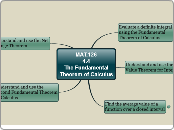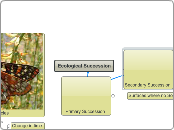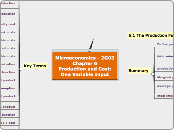MAT.126
4.4
The Fundamental Theorem of Calculus
Understand and use the Second Fundamental Theorem of Calculus
Theorem 4.11
The Second Fundamental Theorem of Calculus
If f is continuous on an open interval I containing a, then, for every x in the interval,
d/dx [ S_a^x f(t) dt ] = f(x).
Accumulation Function
The Definite Integral as a Function of x
The definite integral as a number
S_a^b f(x) dx
The definite integral as a function of x
F(x) = S_a^b f(t) dt
Understand and use the Net Change Theorem
Theorem 4.12
The Net Change Theorem
The definite integral of the rate of change of a quantity F'(x) gives the total change, or net change, in that quantity on the interval [a,b].
S_a^b F'(x) dx = F(b) - F(a) Net change of F
Find the average value of a function over a closed interval
Definition of the average value of a function on an interval
If f is integrable on the closed interval [a,b], then the average value of f on the interval is
1/(b-a) S_a^b f(x) dx.
Understand and use the Mean Value Theorem for Integrals
Theorem 4.10
Mean Value Theorem for Integrals
If f is continuous on the closed interval [a,b], then there exists a number c in the closed interval [a,b] such that
S_a^b f(x) dx = f(c)(b-a).
Evaluate a definite integral using the Fundamental Theorem of Calculus
Guidelines for using the Fundamental Theorem of Calculus
See page 283 in your text.
Note especially item 3: You do not need a constant of integration when working with definite integrals.
Theorem 4.9
The Fundamental Theorem of Calculus
If a function f is continuous on the closed interval [a,b] and F is an antiderivative of f on the interval [a,b], then
S_a^b f(x) dx = F(b) - F(a).
Informally
Differentiation and (definite) integration are inverse operations.
Slope is a quotient. The limit of the slope of secant lines gives the slope of a tangent line.
Area is a product. The limit of the area of rectangles gives the area of a region under a curve.
Quotients and products are inverse operations (division and multiplication).









